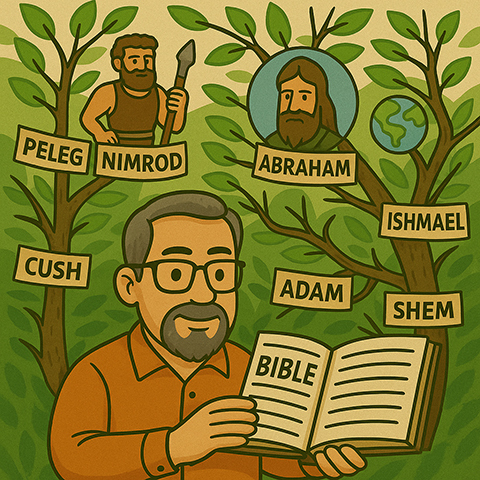April 23rd


Today’s reading from 1 Chronicles 1–2 marks the beginning of a book that, from my daily reading experience, I’ve often approached with a sense of monotony because of the long genealogical lists. I’m praying that through this journey, God would reveal insights beyond my usual takeaway: “God knows our names and we matter to Him.” That’s a beautiful truth, but I trust there’s more for us to uncover.
What struck me today was how the genealogies, which begin in a straightforward manner similar to Matthew and Luke, quickly widen into branches filled with many unfamiliar names. Here and there, the text includes brief parenthetical comments, almost like Easter eggs (hidden treasures) for the reader—offering hope that there is relevancy in an otherwise overwhelming list. That alone encouraged me to keep reading.
Verse 10 caught my attention,
“Nimrod was the first on earth to be a mighty man.”
He’s known for founding several ancient cities—Babel, Erech, Akkad, Nineveh, and others. I connected this to another individual who was given added biographical information, in verse 19, we read,
“Peleg, for in his days the earth was divided.”
This mirrors Genesis 10:25 and brings to mind the Tower of Babel in Genesis 11, when God scattered humanity due to their disobedience to His command to fill the earth (Genesis 1:28). It reminds me that God’s design was always for His people to spread out, multiply, and steward the earth—not settle into self-made kingdoms. Perhaps mentioning Nimrod and Peleg was the author's way of emphasizing God's plan, explaining the broad scope of these genealogies represents the filling of the earth as God intended.
Amid the multitude, God begins narrowing His focus. In the second half of chapter 1, we encounter a familiar name: Abram (v. 27), later called Abraham (v. 28). You’d expect the narrative to continue with Isaac and Jacob, but instead, it follows the previous pattern of branching off into more unfamiliar names with the genealogy of Hagar and Keturah. In verse 38 a man by the name of Seir is mentioned, a person with no recorded ancestry. This shows that the author's intent isn’t strictly meant for chronology—it’s to show the vast tapestry of humanity from which God was choosing one peculiar people: the family of Abraham, through Isaac, Israel, and eventually Judah. From Judah would come the Messiah, Jesus Christ.
Buried in chapter 2 there’s one more fascinating detail I’ll mention: the three nephews of David—Abishai, Joab, and Asahel—names we just saw on April 21. The more carefully you read Scripture, the clearer it becomes. These aren’t just lists, they are building blocks for His divine plan.
So, I encourage you—read these chapters with curiosity. Ask questions. Let Scripture surprise you. There’s something exciting happening here: God’s promise to fill the earth and His intention to bless all nations through Abraham’s line.
“In you all the families of the earth shall be blessed.” —Genesis 12:3
Takeaway: Even in the genealogies—those long lists we’re tempted to skim—God is telling a story of purpose, promise, and redemption. Be encouraged and press on in your life-long journey of studying His Word.